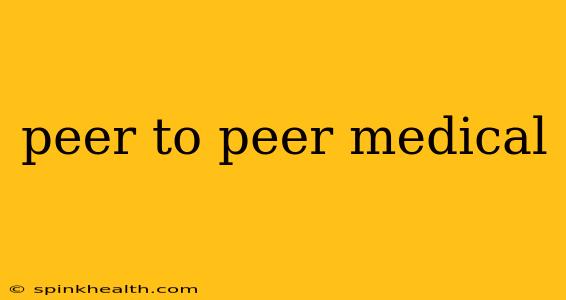Navigating the healthcare system can feel isolating, even overwhelming. Medical diagnoses, treatments, and ongoing management often leave individuals feeling alone and unsure where to turn. This is where the power of peer-to-peer medical support shines. It's a growing movement connecting individuals facing similar health challenges to share experiences, offer encouragement, and build a sense of community. But what exactly is it, and how can it benefit you? Let's delve in.
What is Peer-to-Peer Medical Support?
Peer-to-peer medical support, simply put, involves connecting individuals with shared health experiences. It's not about replacing professional medical advice – that always remains crucial. Instead, it offers a valuable supplementary layer of emotional and informational support. Imagine sharing your anxieties about a new diagnosis with someone who's "been there, done that." That's the core of peer-to-peer support: empathy, understanding, and shared knowledge from people who truly get it.
How Does Peer-to-Peer Medical Support Work?
Several avenues facilitate peer-to-peer medical support. Online forums and communities dedicated to specific conditions are abundant. These spaces offer a safe environment to ask questions, share experiences, and find encouragement from others facing similar challenges. Support groups, both in-person and virtual, provide a structured setting for connection and discussion. Many hospitals and healthcare organizations also offer peer support programs as part of their patient care. These programs often connect patients with trained peer supporters who have navigated similar health journeys.
What are the Benefits of Peer-to-Peer Medical Support?
The benefits are numerous and profound. For many, the most significant advantage is the sense of community and belonging it provides. Feeling understood and less alone can significantly impact mental and emotional well-being during a challenging health experience.
Reduced Feelings of Isolation and Loneliness:
Facing a health issue can often feel isolating. Connecting with others facing similar struggles provides a sense of shared experience, reducing feelings of loneliness and isolation.
Improved Coping Mechanisms and Emotional Well-being:
Sharing experiences and learning coping strategies from others can significantly enhance emotional well-being and resilience.
Increased Knowledge and Understanding of the Condition:
Learning from the lived experiences of others can provide valuable insights and a deeper understanding of a condition, its management, and potential challenges.
Enhanced Adherence to Treatment Plans:
The encouragement and support from peers can motivate individuals to stick to their treatment plans and improve overall outcomes.
What are the Potential Drawbacks of Peer-to-Peer Medical Support?
While peer-to-peer support offers immense benefits, it's essential to acknowledge potential drawbacks.
Misinformation:
It's crucial to remember that peer support is not a substitute for professional medical advice. Information shared within peer groups should be critically evaluated, and always defer to your healthcare provider for accurate and personalized guidance.
Triggering Experiences:
Sharing intensely personal experiences can sometimes be triggering for participants. It's crucial to find groups with supportive moderators and establish boundaries to protect emotional well-being.
Finding the Right Group:
Navigating the abundance of online and offline support groups can be overwhelming. Finding a group that fits your specific needs and preferences is important for a positive experience.
Finding Peer-to-Peer Medical Support: Where to Start?
Your healthcare provider can be a valuable resource in connecting you with appropriate peer support programs or groups. Online searches for support groups dedicated to specific conditions or health concerns can lead to a wealth of resources. Organizations like the National Alliance on Mental Illness (NAMI) and the American Cancer Society offer extensive peer support networks. Remember to research groups thoroughly, ensuring they align with your needs and preferences.
Is Peer-to-Peer Medical Support Right for Me?
Peer-to-peer medical support can be a valuable addition to your overall healthcare journey. Whether you’re dealing with a chronic illness, a recent diagnosis, or simply navigating the complexities of the healthcare system, connecting with others facing similar challenges can make a significant difference in your well-being. The sense of community, shared understanding, and practical advice offered by peer support can be invaluable in enhancing your emotional resilience and overall quality of life. Remember to consult with your healthcare provider to determine if peer support is a suitable option for your situation.

